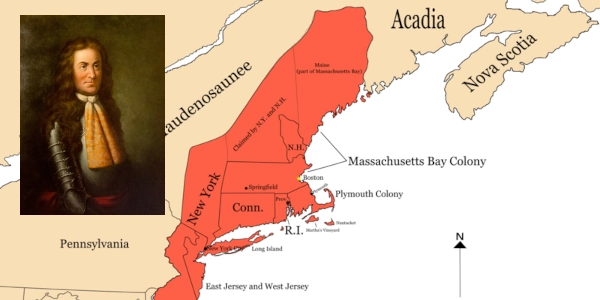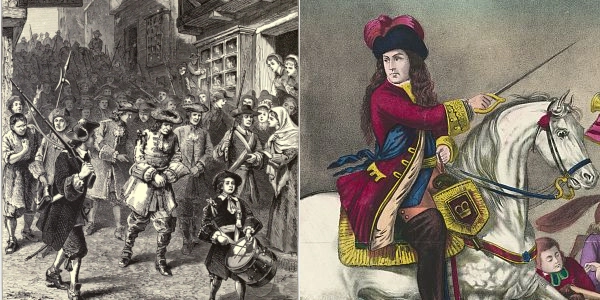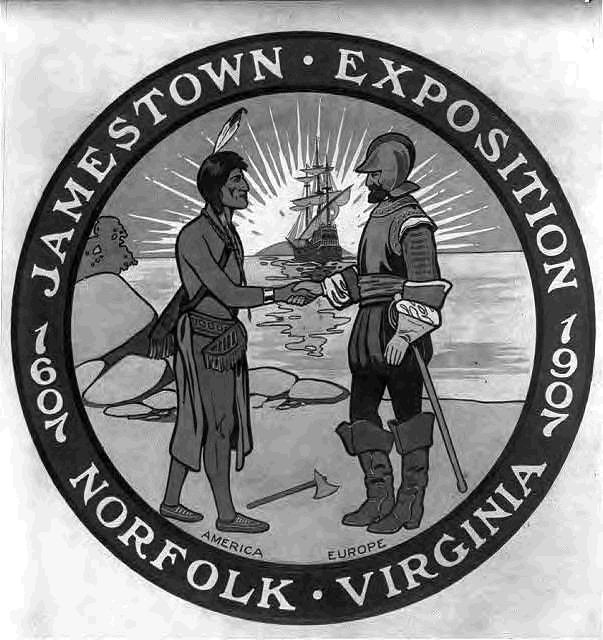Sponsor this page. Your banner or text ad can fill the space above.
Click here to Sponsor the page and how to reserve your ad.
-
Timeline
1689 Detail
April 18, 1689 - Boston revolt against Dominion of New England governor Sir Edmund Andros ends in his removal.

Since April 1888, the newly appointed governor of the Dominion of New England, newly created by King James II in 1868, Sir Edmund Andros, had begun raids into Acadia, claiming that it was English territory, and sparking additional raids, which would lead to King William's War. Not all of his subjects were pleased with this incursion, in large part because it caused retaliation. The Wabanaki Confederacy, allies of New France, killed several settlers in a raid at New Dartmouth, which led to another at Yarmouth, then Kennebunk.
However, there were other reasons behind the tempest surrounding Andros. The Dominion of New England had been an artificial collection of former colonies who had been used to some form of more local government. King James II had patched together New England from Massachusetts, Rhode Island, Connecticut, the Plymouth Plantation, and later after purchase from the Dutch, New Jersey and New York. It would be difficult for anyone to handle, even though some of the reasons, mutual defense, were good, while others, enforcement of the Navigation Acts, were colonial bad.
By 1889, the citizens of Boston had enough of Andros and his war and other policies, although to use the war as reason for his ouster would not be accurate, as the war would continue under new governors as well, lasting a total of nine years and not even declared officially until May 17, 1689 when King William III and Queen Mary II stated it.
There were so many more reasons to dislike him.
Sir Edmund Andros
King James II chose Sir Edmund Andros due to his previous experience. He had been Governor of the colonies of New York and New Jersey from 1674 to 1681. For the new Dominion of New England, Boston was chosen as its capital; Andros arrived there on December 20, 1686. He almost immediately stopped local control at all, disbanding local legislatures and limiting town meetings. A council would serve Andros in governing the entire territory. There would be no Massachusetts Assembly, no Dominion Assembly either. The people of Massachusetts were used to having representatives, not edicts. Andros and his council would approve all laws subject to the approval of the King. Ironically, Andros was not against the idea of an assembly and had requested one when Governor of New York.
However, in the Dominion, there would not be one, and even the council, made up of men who had to travel far for a meeting, often ended up with Andros passing laws by himself. There was no requirement for a quorum. Of those who did attend more often, the council included Edward Randolph, John Usher, Joseph Dudley, William Stoughton, Wait Winthrop, Robert Mason, John West, and Francis Nicholson.
One of the first salvos tossed by Andros in March 1687 was to raise taxes; penny per pound for imports, estates, and poll taxes. The council disapproved. Andros signed it into law anyway. When these new taxes failed to raise enough revenue, he added it to other goods; rum, brandy, and wine. That was not going to win him any favor.
The status of the new Dominion created havoc with land titles. The land colonists thought they owned had their titles voided and given back to the King. They had to petition again for their own lands. This often was subject to new fees and bribery, with Andros confiscating public lands and giving them to his friends.
The Boston Revolt
Large landowners and developers began to turn against the Governor. After King James II issued his Declaration of Indulgence, Anglican church services were allowed in local churches, which made the Puritans mad. Add in maypoles, newly constructed in Boston and Charleston, which the Puritans thought pagan, and you now had a significant part of the religious community against him. It was almost as if the reason of war happening north of Boston was down the list of his troubles. Add in his founding of the first Anglican church in colonial New England, built on public land after the Puritans refused to sell him some of theirs, and his announcement that the Church of England was the official church of the colony, and you had a holy war brewing in Boston while citizens toward Acadia were being slaughtered. The Puritans did not like the Catholic tendencies of the Church of England, including their celebration of Christmas and Easter.
Meanwhile, back in England, the Glorious Revolution was occuring, causing a change at the castle with King James II, a Catholic, abdicating the throne to the pressure of his son-in-law, William of Orange, Protestant, on February 13, 1689. The new King and Queen were now King William III and Queen Mary II, King James II's daughter. By the time the news reached the colonies in March, the mobs in Boston had no reason not to dismantle the Dominion of New England, including Andros as Governor. Mobs began to march the streets of Boston with arms, militias from outside the city marched in assist. A total of two thousand walked to the house where Andros stayed, guarded by only a dozen redcoats. Andros surrendered and was siezed on April 18, 1689, replaced by a Council for Safety.
"We have been quiet, hitherto, but now the Lord has prospered the undertaking of the prince of Orange, we think we should follow such an example. We therefore, seized the vile persons who oppressed us," the Boston mob, 1689.
By May 22, the council had voted to return to the puritan based government of before, reelecting Simon Bradstreet, the former governor to again helm the colony; the other colonies followed suit and reinstituted their former charters. They pledged support to the new King and Queen.
But the new King and Queen had different ideas of how the new charters would differ from the old charters. The Massachusetts Bay Colony became a Royal Colony in 1691, thus disappointing the Puritans, as the colony became more secular in nature.
And don't feel too bad for Sir William Andros. Yes, he spent a year in prison in New England before his release and return to England. But he would return to the colonies, just a different one. In 1692, Andros was made the Governor of Virginia.
Image above: Montage (background) Map of the Dominion of New England in 1688, 2020, Tpwissaa. Courtesy Wikipedia Commons C.C. 4.0.; (inset) Painting of Sir Edmund Andros, Rhode Island State House collection, before 1899, Frederick Stone Batcheller. Courtesy Wikipedia Commons. Image below: Montage (left) Governor Andros a Prisoner in Boston, 1876, F.O.C. Darley, William L. Shepard or Granville Perkins. Courtesy "Pioneers in the Settlement of America" Vol. 1, by William A. Crafts via Wikipedia Commons; (right) King William III at the Battle of the Boyne, 1874, Haasis and Lubrecht. Courtesy Wikipedia Commons. Info source: historyofmassachusetts.org; New England Historical Society; Wikipedia.

History Photo Bomb

However, there were other reasons behind the tempest surrounding Andros. The Dominion of New England had been an artificial collection of former colonies who had been used to some form of more local government. King James II had patched together New England from Massachusetts, Rhode Island, Connecticut, the Plymouth Plantation, and later after purchase from the Dutch, New Jersey and New York. It would be difficult for anyone to handle, even though some of the reasons, mutual defense, were good, while others, enforcement of the Navigation Acts, were colonial bad.
By 1889, the citizens of Boston had enough of Andros and his war and other policies, although to use the war as reason for his ouster would not be accurate, as the war would continue under new governors as well, lasting a total of nine years and not even declared officially until May 17, 1689 when King William III and Queen Mary II stated it.
There were so many more reasons to dislike him.
However, in the Dominion, there would not be one, and even the council, made up of men who had to travel far for a meeting, often ended up with Andros passing laws by himself. There was no requirement for a quorum. Of those who did attend more often, the council included Edward Randolph, John Usher, Joseph Dudley, William Stoughton, Wait Winthrop, Robert Mason, John West, and Francis Nicholson.
One of the first salvos tossed by Andros in March 1687 was to raise taxes; penny per pound for imports, estates, and poll taxes. The council disapproved. Andros signed it into law anyway. When these new taxes failed to raise enough revenue, he added it to other goods; rum, brandy, and wine. That was not going to win him any favor.
The status of the new Dominion created havoc with land titles. The land colonists thought they owned had their titles voided and given back to the King. They had to petition again for their own lands. This often was subject to new fees and bribery, with Andros confiscating public lands and giving them to his friends.
Meanwhile, back in England, the Glorious Revolution was occuring, causing a change at the castle with King James II, a Catholic, abdicating the throne to the pressure of his son-in-law, William of Orange, Protestant, on February 13, 1689. The new King and Queen were now King William III and Queen Mary II, King James II's daughter. By the time the news reached the colonies in March, the mobs in Boston had no reason not to dismantle the Dominion of New England, including Andros as Governor. Mobs began to march the streets of Boston with arms, militias from outside the city marched in assist. A total of two thousand walked to the house where Andros stayed, guarded by only a dozen redcoats. Andros surrendered and was siezed on April 18, 1689, replaced by a Council for Safety.
"We have been quiet, hitherto, but now the Lord has prospered the undertaking of the prince of Orange, we think we should follow such an example. We therefore, seized the vile persons who oppressed us," the Boston mob, 1689.
By May 22, the council had voted to return to the puritan based government of before, reelecting Simon Bradstreet, the former governor to again helm the colony; the other colonies followed suit and reinstituted their former charters. They pledged support to the new King and Queen.
But the new King and Queen had different ideas of how the new charters would differ from the old charters. The Massachusetts Bay Colony became a Royal Colony in 1691, thus disappointing the Puritans, as the colony became more secular in nature.
And don't feel too bad for Sir William Andros. Yes, he spent a year in prison in New England before his release and return to England. But he would return to the colonies, just a different one. In 1692, Andros was made the Governor of Virginia.
Image above: Montage (background) Map of the Dominion of New England in 1688, 2020, Tpwissaa. Courtesy Wikipedia Commons C.C. 4.0.; (inset) Painting of Sir Edmund Andros, Rhode Island State House collection, before 1899, Frederick Stone Batcheller. Courtesy Wikipedia Commons. Image below: Montage (left) Governor Andros a Prisoner in Boston, 1876, F.O.C. Darley, William L. Shepard or Granville Perkins. Courtesy "Pioneers in the Settlement of America" Vol. 1, by William A. Crafts via Wikipedia Commons; (right) King William III at the Battle of the Boyne, 1874, Haasis and Lubrecht. Courtesy Wikipedia Commons. Info source: historyofmassachusetts.org; New England Historical Society; Wikipedia.






